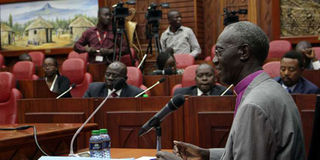Breaking News: At least 10 feared to have drowned in Makueni river
Wabukala vows to rebuild public trust if hired as anti-graft agency head

Retired Anglican Church of Kenya Archbishop Eliud Wabukala appears before National Assembly's Justice and Legal Affairs committee on January 5, 2017 to be vetted following his nomination for anti-corruption commission chairmanship. PHOTO | DENNIS ONSONGO | NATION MEDIA GROUP
What you need to know:
- Reverend Eliud Wabukala said “stability” would be an immediate assignment if Parliament approved his hiring.
- Four Kenyans objected to Rev Wabukala’s nomination, citing his lack of impact as head of the steering committee and the fact that he may have condoned the corrupt in the church — which he refuted.
- The cleric said he often preached against corruption from the pulpit at the All Saints Cathedral in Nairobi.
The nominee for the Ethics and Anti-Corruption Commission (EACC) chairmanship on Thursday promised to “stabilise” its secretariat as a way of rebuilding trust in agency.
Reverend Eliud Wabukala said “stability” would be an immediate assignment if Parliament approved his hiring.
“There is a need to stabilise the secretariat and everyone else working there and also reach out to other groups of professionals, politicians, civil society and all Kenyans in rescuing the country from corruption for sake of our children,” said Rev Wabukala.
The retired Archbishop of the Anglican Church of Kenya (ACK) had appeared before the Justice and Legal Affairs Committee of the National Assembly for vetting, having been nominated for the position by President Uhuru Kenyatta.
His focus on the secretariat headed by Chief Executive Officer Halakhe Waqo may be a pointer to his wanting to rein in infighting and turf wars between the commissioners and secretariat technocrats, which have been blamed for the exit of past chairmen.
Emurua Dikirr Member of Parliament Johanna Ng’eno said merely changing the chairman would not work.
“No matter how many times you change the driver, no matter how good the driver is, the vehicle will not move if the engine is not working properly,” said Mr Ng’eno. “The major issue is the engine, which, in this case, is the secretariat.”
Four Kenyans objected to Rev Wabukala’s nomination, citing his lack of impact as head of the steering committee and the fact that he may have condoned the corrupt in the church — which he refuted.
PREACHED AGAINST GRAFT
Rev Wabukala defended his tenure as chairman of the National Steering Committee for the Fight Against Corruption for 12 years, saying he worked with a shoe-string budget and the mandate of the team was public awareness creation and education on matters corruption. He said “a lot of progress had been achieved”.
The cleric said he often preached against the vice from the pulpit at the All Saints Cathedral in Nairobi. He added that nothing short of a change in culture, ethics and moral fibre of society would register success in the war against graft.
The former Anglican primate said his decision to apply for the position was informed by a calling and patriotism.
The committee will retreat to consider the fate of Rev Wabukala and Independent Electoral and Boundaries Commission (IEBC) nominees set to appear before it next week.
It will put together the two reports for approval or rejection by the House at the January 17 special sitting announced by National Assembly Speaker Justin Muturi.
He said: “Kenyans are much more aware about corruption after initially not wanting to call it by its proper name but that knowledge is yet to translate into action towards eradicating it.”
The former ACK Archbishop said he was well positioned to lead the fight against corruption, from his work as head of the steering team, and also from the fact that he often preached against the vice from the pulpit at the All Saints Cathedral in Nairobi.
LIKELY TO BE TAINTED
The former prelate also said he was aware that he was likely to be tainted as he steered the country towards slaying the dragon of corruption, but termed his decision to apply for the position as informed by a calling and a sense of patriotism.
MPs led by committee chairman Samuel Chepkonga (Ainabkoi) Muriithi Waiganjo (Ol Jororok), Njoroge Baiya (Githunguri) had questioned what the nominee intended to do differently given others had tried and left unexpectedly without much progress, and whether as retired prelate he had the necessary gravitas to lead the war.
Rev Wabukala, who was dressed in a grey suit, a purple shirt and priest’s collar and carrying a blue bag, which he never opened, saying working with government was also divine, as it dealt with fighting evil in society through arrests and prosecution.
He asked for cooperation from all agencies, including the MPs and Kenyans in general, saying such cooperation was required especially in dealing with the rich and powerful some of whom may have used crooked ways in accumulating immense wealth.
The committee will retreat to consider his nomination, together with those of the Independent Electoral and Boundaries Commission nominees set to appear before it next week It will put together the two reports for approval or rejection by the House at the January 17 special sitting announced by National Assembly Speaker Justin Muturi.





